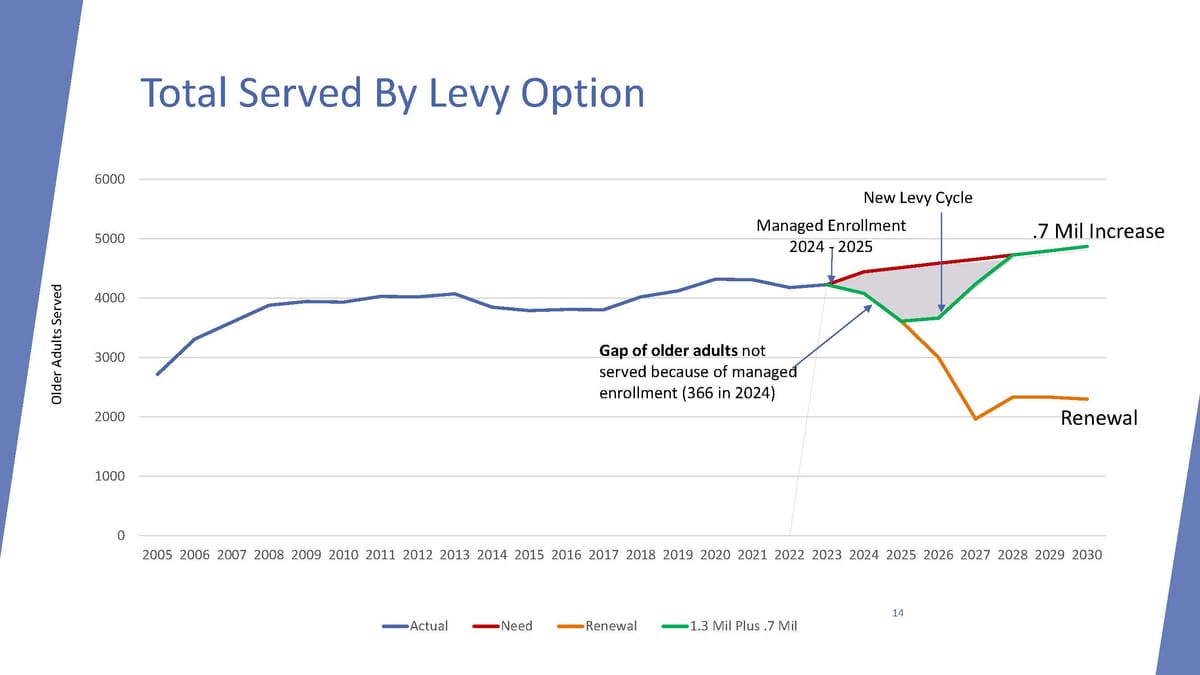Levy to increase elderly service funding in county could appear in November
The Council on Aging is asking for a levy to be placed on the November ballot to increase funding for elderly services in Butler County.

A regional organization is asking to place a levy increase on the November ballot in Butler County to support services for older residents.
The Council on Aging, a five-county nonprofit organization, has received taxpayer-approved levy funding in Butler County since 1996 to support the Elderly Services Program (ESP), which aims to keep elderly residents in their homes by paying for meals, transportation and other care. The levy was last increased in 2005 and has remained static since then.
Ken Wilson, vice president of program operations for the Council on Aging, said the cost of care has increased substantially in the past two decades, while revenue from the levy has stayed relatively static. The ESP functions as a payer of last resort, meaning elderly residents can only tap into the funding if they’ve exhausted other options. ESP covers adult day services, transportation, meal delivery, housekeeping and home improvements for mobility and safety.
“Our goal is to provide cost-effective, efficient and high-quality services to as many older adults throughout Butler County as possible,” Wilson said. “The goal of the program is to give people the option to stay at home and avoid being in a nursing facility, which is a lot more expensive and you lose a lot of your independence.”
The current levy is for 1.3 mills and generates $10.9 million annually. The effective millage rate currently sits at 0.74 mills, though. During a presentation to the Butler County Board of Commissioners on May 27, the Council on Aging proposed a levy renewal with a 0.7-mill increase, which would raise the revenue to $20.2 million annually and increase property taxes by $24.50 per $100,000 of property valuation. Butler County’s current levy revenue is the lowest of all five counties the Council on Aging serves, Wilson said.
Last February, ESP began a managed enrollment process, meaning only clients who meet heightened conditions, like recently being discharged from the hospital, being on dialysis or going through cancer treatment, qualify for ESP funding. Without passing a new levy, Wilson said managed enrollment will need to continue, barring more people from access to services, while Butler County’s elderly population continues to increase.
Since the last levy increase, Butler County’s 60+ population has grown by 79%. A levy increase would allow ESP to meet the increased need for its services instead of cutting people off, Wilson said. The benefits stretch beyond clients, too. Keeping older adults in their homes helps adult children and saves taxpayers money by preventing people from spending down their resources and ending up on Medicaid in nursing homes, Wilson said.
“Almost everyone is touched or will be touched by somebody who is growing older and at some point is going to need assistance to stay independent in their own home,” Wilson said. “It’s one of the most difficult jobs people are ever called to do … They need the extra support in order to be able to continue, and as a taxpayer, everyone should care about this because it’s so much more cost effective to keep people in their own homes.”
Services offered through ESP total roughly $425 per month for clients, while the average nursing home bed in Ohio costs more than $5,000 per month.
Oxford Township resident Sandra, 79, who asked to be identified by first name only to discuss personal details about aging and finances, has gotten Meals on Wheels through ESP for the past three years. She got connected with the program after reaching out to Oxford Seniors and now looks forward to both the daily food and the chance to see people each day.
Confirming her financial information and getting set up with ESP was a simple process, Sandra said. She has family in the area, and having a consistent source of food is comforting for both Sandra and her children.
“I would probably have to depend on other people more often [without the program],” Sandra said. “I do have family close by, but I hate to depend on them all the time and put them out.”
So far, Sandra has only used ESP funding to cover her Meals on Wheels. She said she may use it for other services like transportation and housecleaning in the future, but it hasn’t been necessary yet.
Several services offered by Oxford Seniors can be covered through ESP, said Executive Director Emily Liechty. Adult day services, Meals on Wheels and medical transportation can all be reimbursed through ESP for qualifying adults.
To enroll, Liechty said people who reach out to Oxford Seniors are put in touch with the Council on Aging. Case managers there first try to connect clients to other resources to pay before tapping into ESP funding. Last year, more than 240 older adults in Oxford, College Corner and the four surrounding townships enrolled in ESP.
“These services that we can provide … keep them [home], and the quality of life is better,” Liechty said. “People tend to be healthier when they are home.”
The Butler County Commissioners will need to vote to place the levy on the November ballot this summer, Wilson said. During a May 27 meeting, Commissioner T.C. Rogers said he hopes the Council and others are able to communicate the needs and growing elderly population to the public.
Commissioner Don Dixon called the demographic data staggering but said county taxpayers have so far been generous in protecting the elderly. However, property tax hikes in 2023 have spurred conversations about reform at the state level, including a push to eliminate property taxes entirely. Dixon said he worried that increasing property taxes further through a levy might go against the ESP’s goal of keeping older residents in their homes by making it less affordable.
Liechty said property taxes are essential for several services in Oxford, including both ESP and the Oxford Fire Department, which voters recently approved a levy to support.
“I think everyone should be incredibly worried about those discussions,” Liechty said. “Oxford Seniors, I don’t know how we operate as we do without levy funds and without state funds and without federal funds. We need those funds to exist.”
Levies must be certified at least 90 days before an election, giving the Council on Aging and the commissioners until early August to verify the details for the current proposal. The levy would then need to be approved by a majority of Butler County voters in November.




